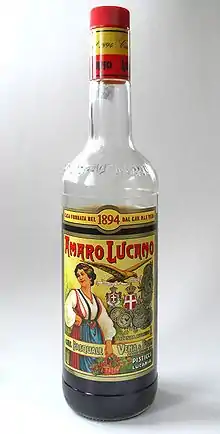40°25′08″N 16°32′50″E / 40.4188786°N 16.5471315°E
 | |
| Type | Liqueur |
|---|---|
| Manufacturer | Amaro Lucano S.p.A. |
| Country of origin | Pisticci, Italy |
| Introduced | 1894 |
| Alcohol by volume | 28.0% |
| Proof (US) | 56 Proof |
| Website | www |
Amaro Lucano is an Italian herbal liqueur in the Amaro category. It is produced by Amaro Lucano S.p.A., a family-owned company based in Pisticci, Basilicata. The adjective "Lucano" comes from Lucania, another name for Basilicata.[1]
History
It was created in 1894 by Pasquale Vena, a pastry chef who blended more than 30 herbs.[2][3] The secret recipe has been passed from generation to generation in the Vena family. In 1900, Amaro Lucano gained fame throughout the Kingdom of Italy, after the Vena family became the official supplier to the House of Savoy,[2][4] whose coat of arms appears on the label.
After a period of recession during World War II, in 1950 the workshop became an industrial enterprise under the management of Vena's sons Leonardo and Giuseppe and in 1965 a new factory in the frazione Pisticci Scalo was opened.
In the 1970s, the Vena family also began producing other alcohol-based drinks under the name "Lucano" such as the Sambuca, Limoncello and Caffè varieties, as well as liqueur-filled chocolates.
The making of Amaro Lucano
The process of preparing Amaro Lucano is divided into seven steps: the selection, the infusion, the processing, the secret, the control, the mixture, and the bottling.[5]
The Selection
The herbs needed for the mixture come from different areas of the world. They are dried naturally, crushed and mixed together. Among the herbs used, there are:.
- Artemisia absinthium
- Artemisia pontica
- Salvia sclarea (Clavy Sage)
- Musk yarrow
- Cnicus (Holy Thistle)
- bitter orange
- Gentiana
- Angelica
- Sambucus elderberry
- Ruta
- aloe
- cinnamon Essential oil
The Infusion
The mixture is steeped in solutions of pure alcohol and water; it then goes through a hot infusion process in thermo-controlled baths (55°/60 °C) overnight.[5]
The Processing
The mixture undergoes hot pressing to obtain an infusion.[5]
The Secret
Once the infusion is ready, the family secret ingredient is added to obtain the extract.[5]
The Control
Laboratory tests are run; the extract is aged for a period of five months. During the aging process, there is stratification, which means that heavy components are on the bottom, while lighter components are on the top. The “heart” of the extract is the one kept.[1]
The Mixture
Pure alcohol, essential oils, water, the aged extract, sugar, caramel and water are mixed in a large tank to get a hydro-alcoholic solution.[5]
The Bottling Line
The mixture is then filtered, bottled and ready to be sold.[5]
Overview
Amaro Lucano is caramel brown in colour, has a bittersweet flavour, and its strength is 28% ABV.[2] It can be savoured neat, chilled, with ice or orange zest. It is usually served as a digestif after a meal and also as a base for cocktails.[2]
Cocktails
Amaro Lucano is used as an apéritif and digestif, after-dinner drink, and all-day drink. It is used in cocktails such as Italian Sangria, Gelato Lucano, Amarcord.[6]
Other products
- Caffè Lucano
- Sambuca Lucano
- Limoncello Lucano
- Vitae
- Barocca
- Amante
- I vitigni del sud
- Passione bianca
Awards
- Gold medal at the San Francisco World Spirits Competition 2014[7]
- Three stars at the Superior Taste Award 2014[8]
- Silver Medal (Gold Medal for the Caffè Lucano) at the Concours Mondial de Bruxelles, Brussels[8]
References
- 1 2 "Checking out Amaro Lucano - Cocktail Wonk". Cocktail Wonk. 2015-05-17. Retrieved 2017-05-03.
- 1 2 3 4 "Amaro Lucano" (PDF). thespiritofitaly.com. Archived from the original (PDF) on 7 December 2014. Retrieved 5 December 2014.
- ↑ Andrea Guccione (16 December 2013). Consuma meridionale: Un manifesto per il sud. Imprimatur editore, 2013. ISBN 978-8868301132.
- ↑ Jared Brown, Anistatia Miller. The Mixellany Guide to Vermouth & Other Aperitifs. Mixellany Limited. ISBN 1907434291.
- 1 2 3 4 5 6 milano, tunnel studios. "The making of a legend | Amaro Lucano". www.amarolucano.it. Archived from the original on 2017-09-11. Retrieved 2017-05-03.
- ↑ milano, tunnel studios. "Mixology". www.amarolucano.it. Retrieved 2017-05-03.
- ↑ "Lucano 1894 Joins Classic & Vintage Artisanal Spirits Collection". prweb.com. Retrieved 6 December 2014.
- 1 2 "Amaro Lucano celebra 120 anni di storia e di successi: Cosa vuoi di più dalla vita?". beverfood.com (in Italian). 16 October 2014. Retrieved 6 December 2014.